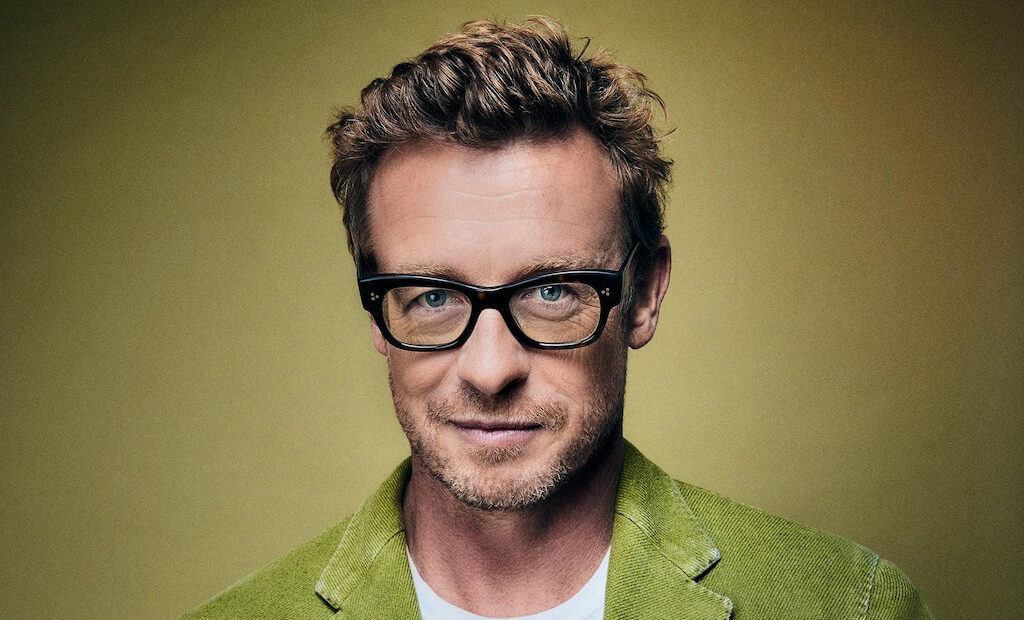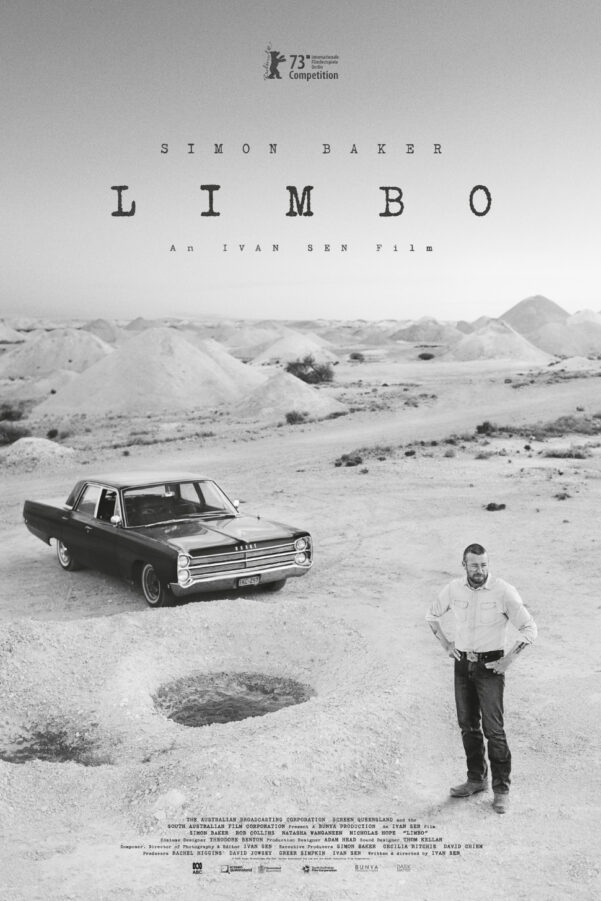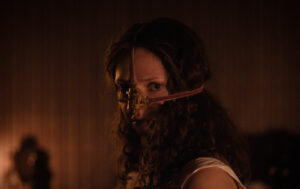“There’s a richness there that’s only really starting to be tapped”: Simon Baker on Limbo at Berlin Film Festival 2023

He’s experienced international success with roles in films such as The Devil Wears Prada and The Ring Two, not to mention 151 episodes of The Mentalist. But, these days, Simon Baker prefers to work where he lives: in his native Australia. The Upcoming sat down with the actor to discuss his latest Australian story, director Ivan Sen’s Limbo, which premiered in the Competition at Berlinale 2023. Shot in luminous black-and-white, the feature stars Baker as Travis Hurley, a police detective sent to the isolated starkness of the outback to investigate the 20-year-old unsolved murder of a young Aboriginal woman.
You shot in Coober Pedy, a fairly remote part of Australia. What was it like to work out there?
It’s good actually. Weirdly, I had shot a film out there before, in about ’99 or 2000 – a Mars film called Red Planet; a terrible movie if I’m to be brutally honest! But I was out there for some time, and I stayed in the same hotel. It’s a weird place.
How did you come to work with Ivan Sen?
I’d met Ivan when he’d just finished film school, and I think it might have been his first film – he offered me his first film straight out of film school, many, many, many, years ago and I didn’t do it. At the time I was living in America, and then we sort of met up again, and he sent me this thing, and sent it to me maybe a year and a half or so before we started shooting. We kind of talked about it backwards and forwards, played around with the script a little bit, and then got the thing together. You know, I work a lot with first-time filmmakers, inexperienced filmmakers, which is exciting because I like the idea of fostering new talents, but, at the same time, there’s a lot of risk associated with that when you’re out there and you’re off [filming], and you can often be in a situation where you’re sort of the most experienced person on the set.
It’s fantastic to work with someone like Ivan. I think a lot like a director, and he’s someone where we have an immediate shorthand and understanding of what each other is doing, and basically an idea or parameters of what we’re going for… to work with someone who you know knows how to do that, because a lot of people will project forward into what they want, but they don’t necessarily know how to mechanically get to that place, or organically get to that place.
So an understanding, and trust, and a strong grasp of the technique and skills helps the evolution of the process, and for me, as an actor, it gives me the freedom and the opportunity to take more risks and explore more of what I have to do – because I feel safe, you know? And I feel confident in his hand, his guiding hand.
Your character is an addict. How did you approach this element of the performance?
I knew about it for a year out; I knew about the film for pretty much a year before we started shooting, I was constantly thinking about it. I work in a very unstructured way in my preparation, generally because, when you start shooting a film, it’s automatically structured. So, this is what we’re shooting this day, then we move here, and so on – so it’s structured in these ten to 15-minute increments. So, creatively, I don’t want to sit there and learn in kind of a didactic way. It didn’t work for me at school, that way of learning, I was not able to function in that kind of: sit there and learn. So, obviously, when I’m gardening, I’m thinking about it; when I’m watching films, I’m thinking about it; when I’m reading stuff, I’m thinking about it and processing it. In a way I kind of have to understand the emotional place of where that character is first to get there, and then within that justification of his behaviour, the choices he makes in his life and how he moves through space and time.
And, like I was saying before, knowing that Ivan has a confident hand in what he’s doing and how to do it, I could relax because I wasn’t worried, and I could talk to him in a way that I could throw ideas at him and it would bounce back. The relationship’s very interesting, because you come together, and you grow together with these different things, and you’re constantly exploring and playing. It just gave me a lot of confidence to take a bit more of a risk, and play and throw myself a bit more into a character. I’m also at an age now where I can actually start to play characters, you know?
You didn’t think that before?
Yeah. I am playing characters – but you’re always playing characters, but it depends on the roles that you’re playing. This character might not have the dimension that you might want to bring to it, and I always felt like a lot of the characters I was playing didn’t have a lot of depth and breath of dimension in them. And even if I brought it, that was always reduced in the cut anyway, because it was a character that needed to provide this role in a more plot-driven piece.
Given that the film explores racism in Australia, how do you think Australian audiences will react to it?
You know I’ve thought a lot about this because I knew I was going to have to do press on this, and obviously there’s a lot about the [Indigenous] voice to parliament referendum in the press, and it’s interesting to try to understand and get like a perspective on it, and really. In simple terms that I’ll jump forward to, where my results sit in my head is that I think people need to be, in general, more compassionate and more understanding across the board – right? Across the board. You saw in New Zealand with Jacinda [Arden’s resignation]. It’s just a pile-on; we’re in this sort of world of a pile-on mentality, and that’s just not productive – you know? And it also makes everyone vulnerable.
So people end up getting to a place where they’re limited to what they say or do, because they’re paralysed by fear of some kind of retribution. So they don’t follow an opinion, and they just pile on with whatever the majority says, and I think that’s a problem, and I think it’s okay to have a difference of opinion with other people – that’s alright – and to be actually able to accept it is to love that person, even though they have a different opinion to you, is evolved. That’s evolved. And that’s where we need to get to. So with the thing of the voice [in Australian parliament], what I don’t like is that the voice itself is being pulled out of the Uluru Statement from the Heart as the first aspect for the referendum.
The only aspect in some coverage.
At the moment, yeah. And, to me, that’s being attacked from all angles. We live at a time where in most Western worlds we have this notion of wedge politics, so you have to think about it this way: in Australia, the last thing that happened in a big way for first Australians within our country was Kevin Rudd, when he apologised. We’ve had five prime ministers since Kevin Rudd, and there’s a lot of complaints about how nothing has happened since then.
It’s almost impossible for anything to happen when you keep changing governments, right? And you have this new regime that comes in, and they’re like, “Okay – we’re not going to fund the arts, we’re not gonna do that, we don’t care about indigenous rights at this point, and we’re doing this; we’re going to do tax cuts for the rich”, and two years later, it’s like, “Who was that guy again?”. They’re gone and someone else is in. So it’s really hard, and I just keep coming back to the compelling argument that the Uluru Statement from the Heart makes for voice, truth and treaty. And I think I stand by that. It would be fantastic if we could have all three of those elements in the referendum right now.
At the same time, I agree that there should always be resistance in regards to those that don’t think the voice is enough; those groups of people, those voices should always be there because they’re always going to hold politicians’ feet to the fire, so that there is follow-through. But I fear that if we end up getting a no on the vote, on the referendum, on the voice here, then if the government changes power and we’re back to a coalition government again, then is it going to come up on the table? I don’t think it’s going to come up on the table again. And then there is no progress. Look, again, I feel that there’s room for everyone, but things always have to move forward. I still stand firmly and support the Uluru Statement from the Heart, first and foremost.
Do you prefer working in Australia, telling Australian stories?
Weirdly, I am sort of more drawn to Australian stories, because there’s a richness there, and a richness there that’s only really starting to be tapped. We actually have a really diverse culture in Australia too, which I think is really cool to explore. And I don’t know if it’s my own sense of national pride, but I do like being close to home. I’ve travelled a lot in my life for work, and I like the stability of being at home. I’ve been through a lot in the last couple of years, through the whole Covid period and with my personal life circumstances, so I like that my relationships with my friends are really strong, and, as I get older, they’re very, very important to me, and a sense of place for me is very important. It’s really important to me.
That doesn’t mean that I won’t work elsewhere. I’m really fortunate that I’m getting opportunities to play characters that have a lot more depth to them in the projects that are coming out of Australia. There’s a richness to that, to me. As an actor, I didn’t necessarily feel I was being satisfied in stuff that I was doing overseas. At the same time when I was living in the States and working in television stuff, there were choices that I made with that to be a provider for my family first and foremost, and my artistic desire was kind of put a bit further back in the priority of things. Where I’m at in my life, I feel a lot more sort of solid in my feet, in my grounding of who I am, and where I am, and what I want to explore creatively.
A lot of TV shows are being revived these days. Is there any chance of bringing back The Mentalist?
No. I mean, there’s always a chance, but probably a very slim to no chance of reviving it with me. No way!
Oliver Johnston
Limbo does not have a UK release date yet. Read our review here.
Read more reviews from our Berlin Film Festival 2023 coverage here.
For further information about the event visit the Berlin Film Festival website here.
Watch the trailer for Limbo here:




























Facebook
Twitter
Instagram
YouTube
RSS